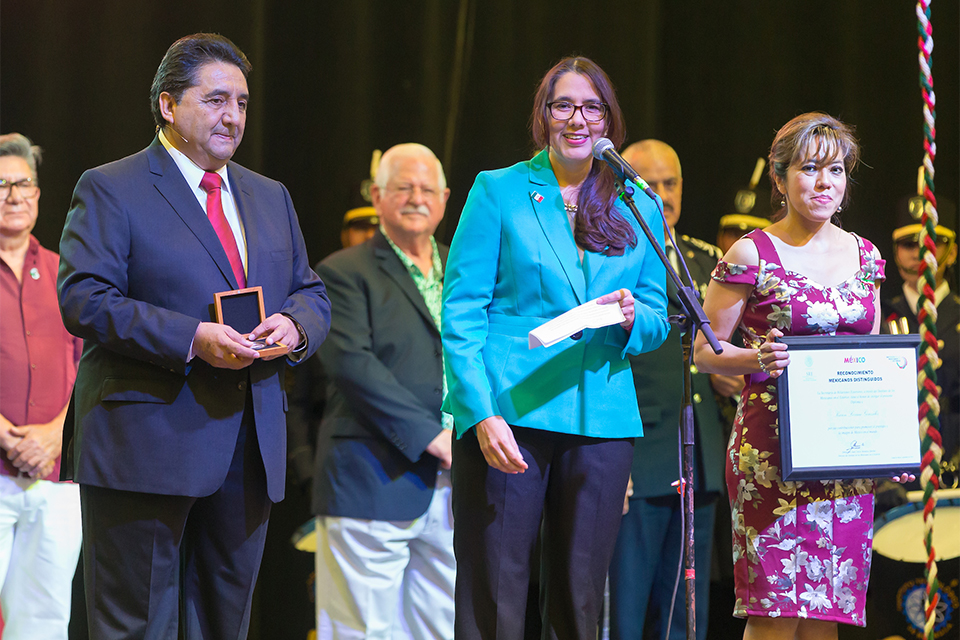By Amanda Alaniz
MCALLEN, TEXAS – Dr. Karen Lozano, a Julia Beecherl Endowed Professor in mechanical engineering, and director of Nanotechnology Center of Excellence at The University of Texas Rio Grande Valley, added another accolade to her list of achievements.
The Monterrey, Nuevo León, native was selected to receive the 2018 “Mexicanos Distinguidos” (Distinguished Mexicans) Award for her impressive achievements in the Science, Technology, Engineering and Mathematics (STEM) fields.
The recognition is presented on behalf of the Government of Mexico, the Institute for Mexicans Abroad (IME) and awarded to Mexican nationals who have lived abroad for at least five years consecutively, and who stand out for their extraordinary professional trajectory, peer recognition and commitment to promote the image of Mexico abroad.
The award acknowledged a total of 31 Distinguished Mexicans who live in 31 cities, in 16 countries. Representatives of Mexico abroad proposed candidates for the recognition; the Consulado de México in McAllen nominated Lozano.
Consul of Mexico in McAllen Eduardo Bernal presented the award to Lozano during the “Grito de La Independencia” ceremony at the City of McAllen’s Fiesta de Palmas on Sept. 23, and bestowed a silver medal, accompanied by a diploma.
Lozano said she felt honored when she found out she was being recognized for her accomplishments in her career.
She previously has been presented with the Outstanding Latino/a Faculty in Higher Education: Research/Teaching (Research Institutions) Award by the American Association of Hispanics in Higher Education, and was named Engineer of the Year by Great Minds in STEM in 2015. In 2013, she participated in an immigration roundtable, at the White House with President Barack Obama.
“Sometimes, I tell the kids to pursue your passion, you live only once, do what you like. But in reality, we have to do things that are harder but provide you opportunities. And then you have to become very passionate about that opportunity,” Lozano said.
She said she struggled and had to overcome problems to fulfill her role as an engineer, and she credits her mother for giving her a piece of wisdom and encouragement to keep pushing forward.
“I started saying I wasn’t going to go into engineering because it’s for boys. My mom asked if it was written somewhere that it’s only for boys. She was being serious, if it was written. I told her, ‘No, there’s not a place, but everyone knows that.’ She said, ‘Why do you have to follow the herd? If you think you can do it, then do it,’” Lozano recalled.
Lozano said she was the only female in her class to graduate in the engineering field when she completed her undergraduate degree at the University of Monterrey.
She then struggled to find a job, before learning of educational opportunities at Rice University. She made the move and completed her Master of Science degree and went on to earn her PhD.
Lozano started her teaching career almost 20 years ago in mechanical engineering, and since then has continued to have an impact in the STEM field.
Last year, a team of mechanical engineering students, guided by Lozano, designed a device that would assist people with Parkinson’s disease to write legibly.
The message she wants her students, and anyone starting out in their career, to know that they will face challenges, but that they have to remember not to give up.
“You work hard and you assume responsibilities for your actions, meaning you don’t blame people around you for what happened. You’ll fall down, yes, you’re going to fall down a thousand times, but then you learn to lift yourself up,” she said.
Lozano maintains a YouTube channel called Karen’s Lab, to teach a younger audience about the engineering field, her way of paying it forward to help spark future innovators, she said.
ABOUT UTRGV
The University of Texas Rio Grande Valley (UTRGV) was created by the Texas Legislature in 2013 as the first major public university of the 21st century in Texas. This transformative initiative provided the opportunity to expand educational opportunities in the Rio Grande Valley, including a new School of Medicine and a School of Podiatry, and made it possible for residents of the region to benefit from the Permanent University Fund – a public endowment contributing support to the University of Texas System and other institutions.
UTRGV has campuses and off-campus research and teaching sites throughout the Rio Grande Valley including Brownsville (formerly The University of Texas at Brownsville campus), Edinburg (formerly The University of Texas-Pan American campus), Harlingen, Weslaco, McAllen, Port Isabel, Rio Grande City and South Padre Island. UTRGV, a comprehensive academic institution, enrolled its first class in the fall of 2015; the School of Medicine welcomed its first class in the summer of 2016, and the School of Podiatric Medicine in the fall of 2022.

